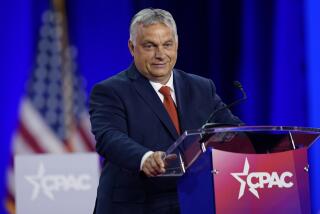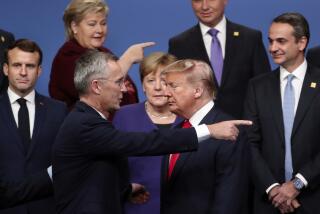Trump hits Turkey with tariffs after talks to free U.S. minister deadlock
Reporting from Washington — Following an impasse in high-level negotiations to free an America preacher detained in Turkey, President Trump on Friday said he had ordered heavy tariffs on Ankara’s export of steel and aluminum to the United States, a punitive move that deepened a growing political and economic rift with the NATO ally.
In a tweet, Trump said he had “just authorized a doubling” of tariffs against Turkey, upping those on aluminum to 20% and steel to 50%. The U.S. imports about $1 billion in steel and aluminum from Turkey, so the direct impact is not likely to be substantial.
But the ripple effects were considerable as the Turkish currency, the lira, plummeted on the news, pushing the country closer to a full-blown economic crisis, and dragging the euro down sharply on Friday.
Without mentioning Trump by name, Turkey’s president, Recep Tayyip Erdogan, denounced the U.S. in a speech Friday in the Black Sea town of Rize. “They cannot use the language of threat and blackmail against this nation,” he said. “Bullying this nation will get them nowhere.”
Then he had a friendly chat with Russian President Vladimir Putin, his office said.
The tariffs would be imposed under U.S. regulations that target “imports from particular countries whose exports threaten to impair national security,” White House spokeswoman Lindsay Walters said in a statement from the New Jersey golf resort where Trump has spent most of the last week.
“Our relations with Turkey are not good at this time!” Trump tweeted. Turkey is a strategically located home to air bases that the U.S. military uses in its wars in Syria, Iraq and elsewhere.
Trump did not mention Andrew Brunson, an evangelical Protestant pastor from North Carolina who has been imprisoned or under house arrest in Turkey for nearly two years for his alleged role in a 2016 coup attempt. Trump previously has demanded Brunson’s immediate release.
But the latest negotiations appear to have deadlocked. Deputy Secretary of State John Sullivan met with his Turkish counterpart for two days at the State Department this week, but the talks ended with no apparent progress. No further talks were scheduled but they weren’t ruled out either, according to the State Department.
The Treasury Department last week blacklisted two senior Turkish officials it considers most responsible for Brunson’s detention, and administration officials hinted at tougher sanctions to come.
Brunson was arrested as part of a massive government crackdown in Turkey following an attempted military coup in 2016 that sought to topple Erdogan. Brunson, who had worked in Turkey for more than two decades, and the U.S. government insist he is innocent of all charges.
Tens of thousands of Turks were arrested in the same crackdown, including several Turkish Americans and three Turkish employees of the U.S. Embassy. The Trump administration is also seeking their release.
Some reports suggested Turkey was trying to trade Brunson for Fethullah Gulen, a Turkish cleric who lives in exile in rural Pennsylvania and whom Erdogan has blamed for the coup attempt. Gulen denies involvement, and the U.S. government says it has no evidence to justify his extradition.
Turkey also is seeking the release of a Turkish banker, Mehmet Hakan Atilla, who was convicted in U.S. federal court in May on sanctions-busting charges related to the purchase of Iranian oil. He was sentenced to 32 months in prison.
Turkish authorities at the time suggested Atilla, deputy chief executive of a major state bank, had been tried in a kangaroo court and that his prosecution was politically motivated.
Relations between the two countries have been strained for more than a year.
Disputes include U.S. support for Kurdish militias fighting in Syria, groups that Turkey considers terrorists; Turkey’s purchase of Russian weapons despite belonging to NATO; and the White House decision to transfer the U.S. Embassy in Israel to Jerusalem, which Ankara opposes.
Turkey has resisted the administration’s efforts to isolate Iran, vowing to continue to do business with Tehran and import its oil, despite a U.S. revival of economic sanctions against the Islamic Republic since Trump pulled out of the Iran nuclear deal.
When Erdogan visited the White House last summer, he reportedly felt slighted when Justice Department authorities again rejected his demand for Gulen’s extradition. His bodyguards later brawled with protesters outside the Turkish ambassador’s residence, injuring several and creating embarrassing headlines.
Local police brought criminal charges against Erdogan’s guards, but eventually dropped the case. They had long since flown back to Turkey.
Trump has run hot and cold on his admiration for Erdogan. He has voiced praise for the Turkish strongman, calling to congratulate Erdogan on winning a referendum that vastly extended his authority, and that critics called unfair. At the summit of the North Atlantic Treaty Organization, Trump was seen giving Erdogan a fist-bump greeting and mouthing the words, “I like him.”
The Brunson case has drawn vocal attention from U.S. evangelicals, including Vice President Mike Pence and Secretary of State Michael R. Pompeo. Brunson, 50, is a member of the Evangelical Presbyterian Church, a conservative Florida-based umbrella congregation incorporating hundreds of churches across the United States.
Evangelicals are especially important to Trump’s political standing and he often pursues causes they hold dear.
When Brunson was remanded from prison to house arrest, Trump tweeted that Brunson was “a great Christian family man and wonderful human being” who was “suffering greatly.”
The legal team working on Brunson’s behalf in the United States, the conservative American Center for Law and Justice, continued to voice optimism for the his release.
“We are working with the president, vice president, and the secretary of state as well as members of Congress,” the center’s chief counsel, Jay Sekulow, said in a statement. “The president and his team remain committed to securing the release of Pastor Brunson and we remain hopeful that will occur soon.”
Sekulow is also a member of Trump’s personal legal team handling responses to the special counsel investigation into Russian election meddling.
Turkey’s escalating tensions with the U.S. have exposed long-standing domestic economic problems under Erdogan’s stewardship — and the result has been a reckoning in financial markets, particular the Turkish currency.
After sliding much of the week, the lira plunged more than 15% on Friday against the dollar, setting off a broad decline in global stocks and a drop in currencies of other developing economies. But the euro and the British pound also took a sizable hit against the dollar.
In punishing the lira, which is down more than 40% over the last year, investors have made clear they have no confidence in Erdogan’s economic management team, including specifically his son-in-law.
Experts say Turkey has long needed to raise interest rates and slow its economy to a more sustainable pace, to attract foreign capital and halt a weakening lira, which will make it harder for Turkish borrowers to pay off loans denominated in dollars.
With U.S. interest rates heading higher, capital is flowing back to the U.S., and Turkey, more than most other emerging markets, is vulnerable because Erdogan for years has focused on driving up growth fueled with cheap credit.
In refusing to change course in his economic plan, “the Turkish president has decided to play a game of chicken with the international financial markets,” said Aaron Stein, a Turkey expert and senior fellow at the Atlantic Council, a think tank in Washington.
“This is a suicide mission. He will not win this war,” he said.
Friday’s drop in the euro, to a one-year low of $1.14, stems in part from concerns that some European banks have considerable exposure to loans in Turkey. But Nicolas Veron, a senior fellow at Bruegel, a think tank in Brussels, worries that the pressure on the euro captures broader fears of a destabilizing situation in Turkey that could spill over to Europe.
Specifically, he said, Europeans worry that turmoil in Turkey could reactivate the kind of refugee crisis that beleaguered the continent in 2015.
“The real issue [is] that Turkey is obviously a very sensitive location,” Veron said. “It’s not only refugees. It’s NATO, it’s Syria, it’s the relationship with Russia. Turkey is such a complicated and strategically located country, so if something big happens in Turkey it has consequences.”
Special correspondent Umar Farooq contributed from Istanbul.
UPDATES:
3:15 p.m.: The story was updated with reaction from Turkey and other details.
6:30 a.m.: The story was updated with additional details and context.
The story was originally published at 6:15 a.m.
More to Read
Inside the business of entertainment
The Wide Shot brings you news, analysis and insights on everything from streaming wars to production — and what it all means for the future.
You may occasionally receive promotional content from the Los Angeles Times.












